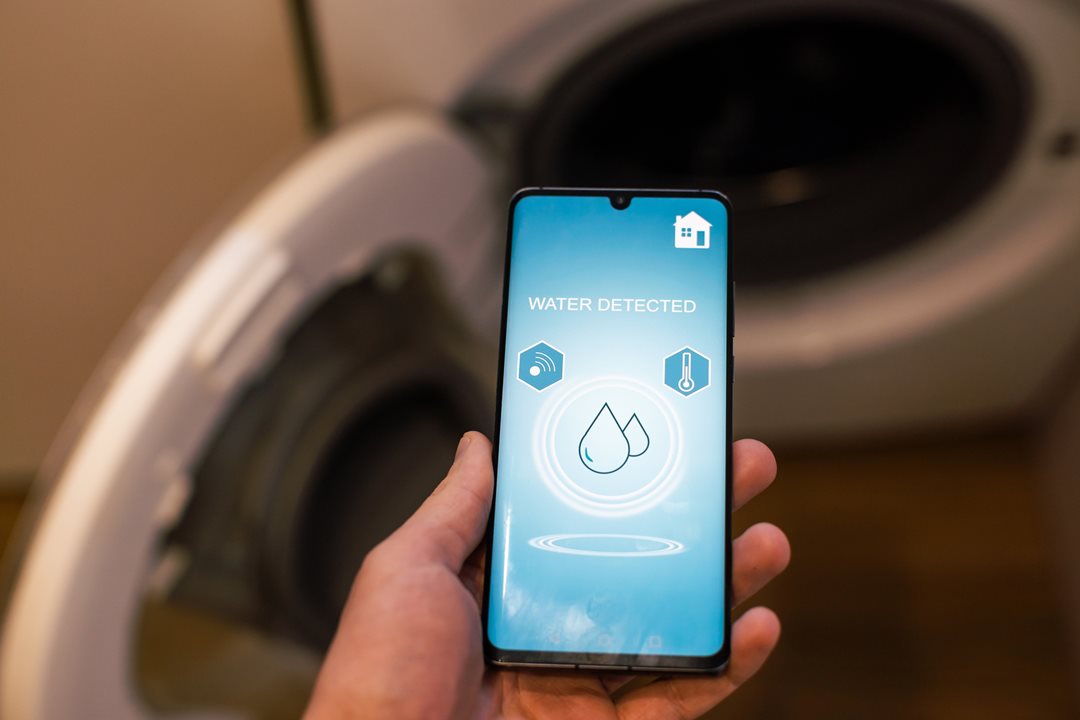Water leak sensors: The "missing" alarm your home needs | PEMCO
.jpg) Water leak sensors may be the best-kept secret in home security. These small DIY wireless devices can send alerts to your smartphone if they detect leaks under sinks and around toilets, refrigerators, washing machines, water heaters, sump pumps, and more – giving you the precious minutes you need to shut off the water and stop a small leak from ballooning into a damaging flood. They even can be hooked up to a smart whole-house water shutoff valve to stop leaks when you’re away. Win, win!
Water leak sensors may be the best-kept secret in home security. These small DIY wireless devices can send alerts to your smartphone if they detect leaks under sinks and around toilets, refrigerators, washing machines, water heaters, sump pumps, and more – giving you the precious minutes you need to shut off the water and stop a small leak from ballooning into a damaging flood. They even can be hooked up to a smart whole-house water shutoff valve to stop leaks when you’re away. Win, win!
Yet, in a recent PEMCO survey, more than a third of homeowners said they'd never heard of them.
Part of the reason may be that they’ve become truly affordable only recently (think how wireless tech has made security alarms and doorbell cameras almost as common as smoke and carbon monoxide detectors). And unlike their hardwired predecessors, they’re portable, an added plus for renters since they can take the sensors with them when they move.
Here's what to know about water leak sensors – perhaps just in time for a practical holiday gift that you can give yourself or family members.
How smart water leak sensors work
Although specifics vary among water sensor systems, the basic idea is you place a wireless water sensor near leak-prone appliances like washing machines, dishwashers, refrigerator ice-makers, water heaters, toilets, and sump pumps. If a sensor detects a leak, it sounds an alarm and sends an alert to your phone so you (or a neighbor or building manager you include on your “notify” list) can turn off the water right away. Some can connect to a smart whole-house water shutoff valve to turn off the water supply automatically if a leak is detected – a real plus when you’re away from home!
Because they’re wireless, water sensors don’t require special training to install. After buying the hardware (a base, sensors, and sometimes optional probes you can snake under appliances), you usually download an app, create an account, and do a wireless setup.
A leading national consumer magazine recently reviewed smart water sensors and offered its take on seven popular detection-only models as well as some detection-and-shutoff models. (A digital subscription may be required to view the full article.)
Why you need water leak sensors
When homeowners buy insurance, they’re most often worried about protecting themselves against fire and burglary. But it turns out, water damage and freezing are much more common reasons for filing insurance claims, topped nationally only by hail and windstorms, according to the Insurance Information Institute (III).
During a five-year study spanning 2018-2022, III researchers found that freezing and water leaks damaged about one in 63 American homes severely enough to file an insurance claim. The average cost to repair: $13,954.
Fortunately, that’s where water leak sensors can help. In a frequently cited study from 2011, ACE Private Risk Services (a provider of high-net-worth personal lines insurance) found that 93% of water damage costs could be prevented or minimized when homeowners use a combination of water sensors and an automatic whole-house water shutoff valve. The trick is catching the leak early, and then having the shutoff kick in to stop potential damage in its tracks. The study noted the sensors and shutoffs were not effective for other types of leaks, like those from roofs.
Water leak sensors also can complement smart thermostats, which not only adjust the temperature of your home based on your schedule, but may alert you about changes in temperature and humidity in your home – another good defense against freezing pipes, mold growth, and other problems related to water damage.
Water leak monitoring can help you save on insurance
Besides saving you from the hassle and heartache of dealing with water damage and a costly demolition, decontamination, and repair process, water leak sensors can qualify you for a protection device discount on your PEMCO Homeowner, Condo, or Renter policy. Talk to your local PEMCO agent or contact 1-800-GO-PEMCO to learn more.
Ready to take a deeper dive into preventing water leak damage? Check out these tips to maintain, monitor, and inspect your home’s water systems.
Share on social media